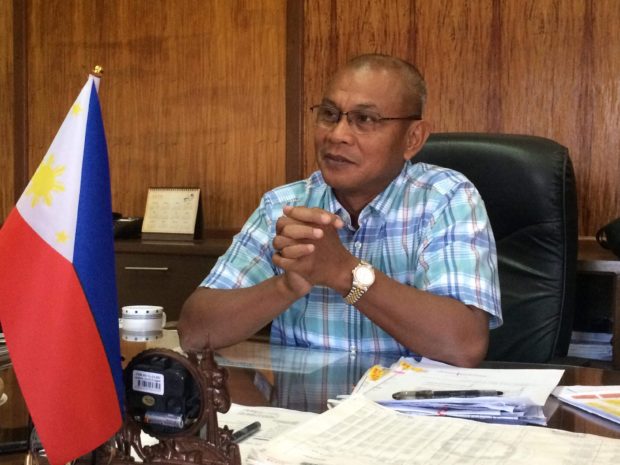
Chief Supt. Valfrie Tabian, the acting director general of Bureau of Corrections, is hopeful that his mistah in the Philippine Military Academy, Director General Ronald “Bato” dela Rosa will fulfill his promise to get rid of drugs in National Bilibid Prison. PHOTO BY JONNABETH ORTEGA / INQUIRER
Cleaning up the national penitentiary of illegal drugs may be a daunting task, but it would a breeze for retired Philippine National Police (PNP) chief Director General Ronald “Bato” dela Rosa who will be its next chief.
“It is not easy but it won’t be that hard to achieve,” Chief Superintendent Valfrie Tabian, acting chief of the Bureau of Corrections (BuCor), said in an interview. “When he starts his term, he won’t be groping in the dark because we’ve done the groundwork.”
Tabian, who was Dela Rosa’s “mistah” or classmate at the Philippine Military Academy (Sinagtala Class of 1986), was appointed as BuCor’s officer in charge in September last year.
He claims that the NBP is now free of illegal drugs, and the morale of the more than 3,000 BuCor personnel is at an all-time high.
Once Dela Rosa assumes his post as BuCor chief, Tabian will return as deputy director general for administration or the agency’s second in command.
No more drugs in Bilibid?
Asked about the presence of shabu (crystal meth) at the NBP, Tabian told the Inquirer: “Wala na. Hirap na silang magpasok dahil mahigpit na kami sa drugs.” (There are no more drugs in Bilibid. The drug lords are having a hard time now getting their drugs inside the national penitentiary because we are stricter.)
Authorities have disclosed that the national penitentiary was the source of most illegal drugs in the country. Senator Leila de Lima was arrested and detained for allegedly conniving with drug lords in the Bilibid during her term as justice secretary.
A week before he retired from the PNP, Dela Rosa disclosed that his next job would be to lead BuCor and he will succeed in cleaning up the national penitentiary.
“Mark my word, I will succeed. I won’t be defeated by the drug lords [of Bilibid],” he said. “As to how I will do it, just use your wild imagination.”
The former PNP chief also said that his first objective as the corrections chief would be to identify and account all drug lords.
Tabian said BuCor had identified drug lords even at the medium security compound, but they had been transferred to the maximum security compound where their activities will be more closely monitored.
He added that a new batch of Special Action Force (SAF) troopers have also deployed to the maximum security compound. The Philippine Drug Enforcement Agency (PDEA) has also set up a satellite office there to monitor reported drug activities 24×7.
Inspections and security at the NBP gates likewise remained stringent after authorities learned that inmates’ visitors may be the ones bringing drugs and other contraband such as cellphones.
High morale
Tabian’s appointment came after BuCor’s previous chief, Benjamin delos Santos, resigned in July 2017 after serving only for eight months.
His predecessor, former deputy director for operations Rolando Asuncion also resigned in January 2017 after he was accused of corruption. He allegedly received a vehicle from a high-profile inmate.
Morale was very low then, with critics saying the NBP is not capable of securing its 46,000 inmates, and that SAF men were needed to be deployed as critical additional force.
Tabian disclosed that many BuCor personnel can easily earn P50,000 by helping inmates smuggling a piece of cellphone inside the jail. This proved attractive because of the low pay. A Prison Guard 1 used to receive only a P12,975 monthly salary.
However, under the new scheme approved by the Department of Budget and Management (DBM) on March 16, BuCor personnel would have the same benefits and compensation as that of their counterparts in the police, military, and other uniformed personnel. An entry-level Corrections Officer 1 (formerly Prison Guard 1), will now get a monthly salary of P29,668 per month.
“They are really happy. Their morale is at all-time high. Years after being neglected, they finally felt being acknowledged as uniformed personnel,” he said. “We are hoping that this pay increase would deter them from being used or influenced by the inmates.
In addition, the BuCor’s structure will now be similar to the PNP, with their personnel being recognized as “fully uniformed personnel,” complete with ranks and insignias of their own. From Prison Guards, they are now called Corrections Officers.
He cited one of the advantages of this restructuring is that the BuCor will get its own Internal Affairs Division, which will work directly under Dela Rosa when he assumes office to instill discipline among its ranks.
The DBM also allowed them to hire an additional 500 corrections officers this year, to augment its workforce of 46,000. Currently, one BuCor personnel is assigned to cover 66 inmates, which is far from the ideal guard-inmate ratio of 1:7.
First BuCor generals
On April 24, three of BuCor’s officials will become its first one-star generals, with a rank of Corrections Chief Superintendent.
They are Roberto Rabo, superintendent of NBP; Richard Schwarzkopf, superintendent of Iwahig prison in Palawan; and Resurreccion Puno, superintendent of Sablayan prison in Occidental Mindoro.
“[Dela Rosa] taking the helm of BuCor soon may boost further the morale of its personnel, just like what he did in PNP,” Tabian said, adding that maybe his close connections to the President may be helpful in addressing the other problems in BuCor faster.” /ee